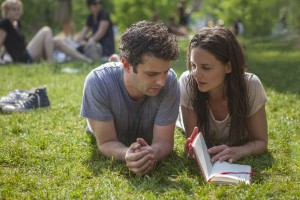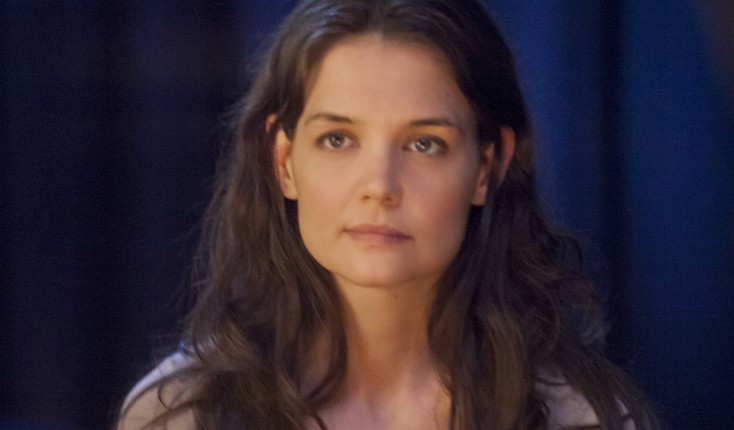
Luke Kirby and Katie Holmes in Paul Dalio’s TOUCHED WITH FIRE. ©Roadside Attractions. CR: Joey Kuhn.
By ANGELA DAWSON
Front Row Features
NEW YORK—Katie Holmes plays a poet with bipolar disorder whose work is fueled by her emotional extremes in the romantic drama “Touched With Fire.” As Carla, she meets Marco, also a poet (played by Luke Kirby, TV’s “Rectify”), with the same condition while receiving treatment at a psychiatric hospital. Carla and Marco’s chemistry is instant and intense, and they begin to drive each other’s mania to new heights. As their relationship intensifies, they break away from the bounds of sanity, swinging them from fantastical highs to tormented lows until they eventually have to choose between sanity and love.
Inspired by the filmmaker’s own struggles to overcome bipolar disorder, Paul Dalio wrote, directed, edited and scored this feature film debut, which also includes performances by Griffin Dunne, Christine Lahti and Bruce Altman. Spike Lee, who was one of Dalio’s film school mentors, executive produced the drama.
The 37-year-old divorced mother, who previously was married to actor Tom Cruise with whom she has a daughter, spoke about why she wanted to play this troubled character and working with Dalio and her fellow cast members.
Q: What was it like being in this film?
Holmes: This was a really wonderfully creative experience. For myself, I approached this project without knowing much about this disease. When I met with Paul, I was so inspired by his passion and his willingness to bring such a personal story to the screen, and the opportunity to take on a role of such challenge was really something that seemed right. It was wonderful working with everyone.
Q: How was Luke Kirby as your co-star and love interest?
Holmes: It was wonderful working with Luke. We both prepared on our own and then we had a lot of rehearsal, and we depended a lot on Paul to guide our characters, and we had a great time. Everybody on the crew and in the cast had great stories we shared and I realized through this process how many people have been affected personally, and so it made the work really rewarding.
Q: This is one of your more emotional and intense roles. What did you learn about yourself?
Holmes: It was very emotional and I think when you prepare for any role there’s a lot of rehearsal and a lot of research and this was just a wonderful acting experience and it was because of this whole cast, and Paul (the director).
We were really allowed to have the freedom to try different things because these characters are going through such highs and lows and so finding the right degree of that high and the right degree of the low, we really had the space to do that. So it was really wonderful as an actor to go to work every day and feel like you could try something and it was okay. We were like a team and we were inspired to create an authentic portrayal of something that is really important. Everybody was very helpful.
Q: What excites you most about being part of this film about a disorder that affects so many people?
Holmes: Well I was really excited when I read the script and really happy to be involved as I was able to be. I’m so proud of this movie and what everybody has done, especially Paul. The work he has done is truly incredible. For all of us, from the beginning, it was about creating real characters. This is the real thing. It’s not somebody’s idea. It’s really what it’s like because this was based on real experiences. And we had this wonderful opportunity where Paul was giving us his real life experiences. It was very helpful in helping us portray our characters as well as he could.
Q: I see you had a producer’s credit on this film? What did that involve?
Holmes: (She chuckles.) They did most of the work.
Q: Carla elects to (SPOILER ALERT) have an abortion. Do you expect a backlash from pro-lifers?
Holmes: It was part of the narrative. It was put there to put some realistic stakes in these people’s lives. And the character’s choice is the character’s choice in the story. It’s not a statement. It’s just what happens in this story.
Q: This movie is about personal growth. How have you grown in the past few years and why?
Holmes: I think this movie’s more of an exploration of people at a certain time in their lives, and trying to figure out the right way to deal with an illness. As an actor, I think that this was an incredible experience to grow creatively and it’s because of this wonderful group of people. We had a really great time making this and so many friendships came out of it. I look at this project a wonderful creative time.
Q: This movie deals with quite deep issues like medication and bipolarity and pregnancy. Which messages resonated with you?
Holmes: I’m proud of the whole piece. You take away from it your own experience and that’s a really wonderful thing to be part of. That’s the reason to do things so that if someone starts the movie thinking one thing and hopefully at the end of the movie they’ve learned something. With this, you really do and I’m proud of that. Or maybe you don’t but you recognize an experience you’ve had. It’s also a wonderful gift to be part of something that can do that, and I’m proud of that.
Q: How was it working with Christine Lahti, who plays your mother? She also has real life experience with a family member who had this condition.
Holmes: Working with Christine (Lahti) was incredible and she taught me so much about acting but she also really inspired me by her personal story. She taught me what it was like by sharing her experience. Doing our scenes together was incredible. I wanted to keep doing more and more takes because we got to be free and try stuff. She’s just amazing. So I wanted to do 10 more takes.





